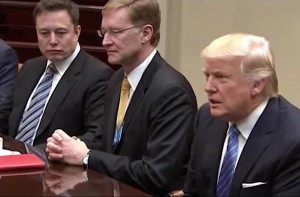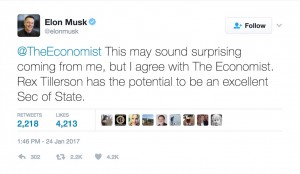
Elon Musk, left, listens intently as President Donald Trump, right, talks during a meeting with leading U.S. tech executives.
At first glance, they might seem to be polar opposites: one has proclaimed his desire to save the world from the effects of global warming and environmental degradation. The other has declared climate change a “hoax” perpetrated by the Chinese, and is kick-starting two controversial oil pipelines while naming a former oil executive to be his new Secretary of State.
True, they both claim to be wealthy entrepreneurs, but the unexpectedly cozy relationship that is developing between Tesla Motors founder and CEO Elon Musk and new President Donald Trump is nonetheless taking many observers, especially those in the environmental community, by surprise.
It wasn’t necessarily the decision to join the new president’s business advisory board – along with traditional auto industry leader Mary Barra, the CEO of General Motors – nor the White House meeting on Monday. But what really shocked Musk’s legion of fans was his Tuesday announcement endorsing the choice of Rex Tillerson as Trump’s Secretary of State.
Responding to an endorsement of the former ExxonMobil CEO by Britain’s The Economist, Musk wrote that, “This may sound surprising coming from me, but I agree (that) Rex Tillerson has the potential to be an excellent Sec of State.”
(California ready to battle with Trump over emissions. Click Here for the story.)
Prodded to explain by a reporter, Musk issued a tweet declaring, “Rex is an exceptionally competent executive, understands geopolitics and knows how to win for his team. His team is now the USA.”
Tillerson, a 64-year-old Texas native, has been anything but the darling of the environmental movement during his career. Prior to joining the Trump cabinet he served as Chairman and CEO of ExxonMobil, an oil giant which, critics have claimed, devotes far less of its resources to alternative energy than key competitors.
That would appear to dovetail well with the views of the new president, Trump having once called global warming a “hoax” designed by the Chinese to help cripple American manufacturing, although he’s attempted to backtrack from that characterization.
Tillerson has taken a slightly more open position, acknowledging that “the increase in greenhouse gas is having an effect,” during his Senate confirmation hearings this month. But he also appeared to back away from the need to take any immediate action, telling Senators, “Our ability to predict that effect is very limited.”
For his part, Musk has frequently cited environmental degradation as a key reason why he launched Tesla Motors. He has been a frequent critic of Big Oil and those who would continue to use it to fuel automobiles.
His passionate positions have earned him a legion of fans – something that translated into more than 400,000 advance registrations for the new Tesla Model 3 sedan that is expected to come to market later this year.
(Big Three executives hear Trump’s pleas for more jobs. For more, Click Here.)
Until recently, there seemed to be only a few things that linked Musk and Trump. Beyond their apparent business acumen, both are passionate users of Twitter – albeit more commonly for cross purposes. Musk has frequently repeated his concerns about the environment in 160-character chunks, while Trump has criticized what he has described as regulatory excess.
So, Musk’s endorsement took many by even more of a surprise coming on the same day that the new president issued executive orders to permit two controversial oil project to move forward, including the Keystone Pipeline, that had been blocked by former President Barack Obama.
The Tesla CEO’s latest moves are all the more surprising, critics note, considering the position he staked out during the election, when he declared in a pre-election interview on CNBC that candidate Trump was “probably not the right guy” for the White House.
Why the apparent change in direction? Musk and Tesla spokespersons are not responding. But there has been speculation he may be hoping to at least develop some sort of influence over a president who has so far shown little interest in environmental matters. Skeptics also question whether Musk might be looking to lock down even more business for his other business: the SpaceX rocket company, which already has billions of dollars in launch contracts from NASA.
Whatever the reason, there could be a backlash brewing, including a slew of Twitter comments such as one asking, “What did they promise you in the golden room?”
Observers have long stressed that Tesla’s strong public following – and its high-flying stock price – are based on Musk character and reputation. Should that now begin to tarnish and chip it could hurt Tesla as well as the South African-born executive himself. One test will be to see if those preliminary Model 3 reservations translate into actual sales once the battery-car begins to roll down the line later this year.
(For more on the Trans-Pacific Partnership announcement, Click Here.)
With alternatives like the new Chevrolet Bolt EV coming to market, once-loyal Tesla fans could display their frustration by hitting Musk and company in the pocketbook.


It seems unfortunately the smooching has begun.
Paul, you should leave your bias on the editing floor.
I stand on my head to avoid introducing bias, Dave. That does not mean that something negative to a candidate, politician, exec, etc., won’t be reported if the story and angle are legitimate. If anything, I have been accused of trying hard to find balance when reporting on a new president who, for one thing, has repeatedly taken credit for actions by the auto industry that had absolutely nothing to do with him, rather than just coming out and using a word like “lie.”
The fact that someone — Musk — has made a seeming U-turn after taking a strong, pre-election position on Trump is, in itself, news, as is the strongly negative response from some of his traditional fans. The fact that Musk and Trump have diametrically opposing viewpoints on global warming, EVs and the environment make the story even more significant.
Paul E.